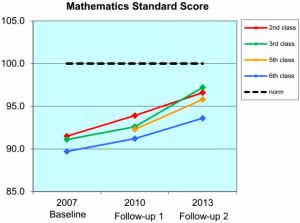
Parents can’t help with today’s new math – that’s what is claimed. However, the math of yesterday is no longer being taught in schools – what now? In past years, teachers as well as parents focused on memorization of skills, facts, and procedures. Students were forced to take timed-tests in order to learn basic facts.
The research on timed test states “…it makes no instructional sense.” Children that perform poorly or work slowly run the risk of reinforcing wrong learning. This practice also produces a negative attitude toward mathematics in general. In the last decade, research has shown that memorization does not generate number sense – that is to say that students just learn the how and not the why. Students don’t learn or understand relative values or how to devise strategies when adding, subtracting, multiplying, or dividing. The children that perform well on timed tests only focus on rote memorization skills. Today’s math stresses understanding.
According to the National Council of Teachers of Mathematics, “…students have made a steady improvement in math when the National Council of teachers of Mathematics began advocating standards-based mathematics education and learning with understanding.”
There are many complaints about today’s math lessons and homework assignments. Parents do not recognize the process that their children are using and are unable to help when a question arises. To understand the changes in today’s mathematical processes, an understanding of how the world has evolved over the past decades is important. There are advances in science, technology, and social media that make it important for students to learn more math and to acquire number sense of the what and why of number operations. Simple skills in arithmetic aren’t enough. An understanding of patterns, algebra, geometry, statistics, and probability is necessary for today’s job force. Students need to build an awareness of the real world and be able to explain their thinking.
Building mathematical understanding in the early years of education is critical. The young learners’ future understanding requires a solid foundation which must start early through experiencing mathematics and acquiring number sense. When young children engage in math experiences, they develop confidence in their ability to understand and use mathematics. They develop curiosity, imagination, flexibility, inventiveness, and persistence that contribute to future success.
The traditional method of memorizing steps to get answers is no longer acceptable. Effort is made to engage students in high-level tasks and develop conceptual understanding, reasoning, and thinking. A useful guide for parents can be found at commoncore.org.
It is good that today’s schools are encouraging more than one way to solve math problems and concepts. Even though most adults were taught using a traditional method, adaptations to memorized skills are made for processes such as calculating tips, working with decimals, changing measurements, etc. Adults naturally use the same skills that are being taught today when mentally calculating. It’s important that students explain how they arrived at an answer – not just memorize a formula. Students are inventing logical methods to solve math problem using their individual learning styles. Students are guided through their own sense-making process to understand numbers and operations and to find the most efficient method for each calculation. If as a parent, you are frustrated, reach out to your school’s teachers to help you understand. Give children the opportunity to make sense of math before condemning the process. Let’s work to give our students a love and understanding of mathematics.


